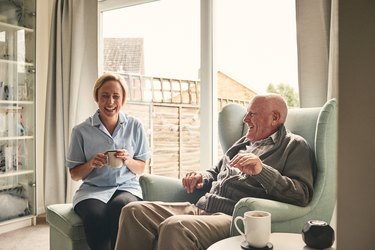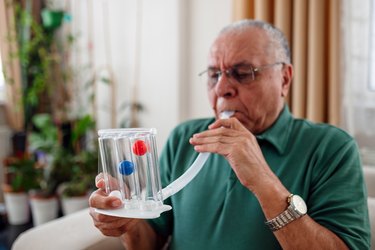
If you know someone with COPD (that's chronic obstructive pulmonary disease), you know symptoms like shortness of breath, coughing and wheezing can affect their quality of life, making even everyday activities that much harder. But there are ways you can help.
In fact, if you have a loved one living with COPD, supporting them through their condition can be vitally important. Beyond the physical challenges of the disease, it can affect a person's mental health as well: People with COPD are more likely to have depression, according to the Centers for Disease Control and Prevention, and they're less likely to engage in social activities like eating out or getting together with friends.
Video of the Day
Video of the Day
What's more, people with COPD tend to experience flare-ups in their condition as the disease progresses, so it's important to have a support system in place to help get through them, Glenn VanOtteren, MD, chief of the Division of Pulmonary, Critical Care & Sleep Medicine for Spectrum Health,tells LIVESTRONG.com.
First, keep in mind that COPD is a term that encompasses a variety of breathing conditions, so there is no one-size-fits-all type of care when it comes to COPD. Some people with COPD may need a lot of support, while others will only need occasional help.
It's always best if you can talk to the doctor who is overseeing your loved one's COPD care and ask how you can best support them. For instance, they may have a priority goal that you can help your loved one work toward, or a schedule of doctor's appointments they need to keep.
In general, though, here are some ways to help someone with COPD on a practical level:
1. Help Them Quit Smoking
The best thing you can do for anyone with COPD is to offer any assistance you can to help them quit smoking, says Dr. VanOtteren. Social support is key to quitting, per the CDC.
- Talk to them about how to quit smoking, and come up with a plan together that they can stick with.
- Help them look for a smoking cessation group at their local hospital.
- Connect them with the American Lung Association's Lung Helpline and Tobacco Quitline.
- Check in with them often about their quit plan and offer encouragement.
- If you're a smoker, consider joining them in quitting. Not only can you support one another, but this helps them avoid secondhand smoke, which can further damage their lungs and worsen COPD, Dr. VanOtteren says.
2. Make Sure They're in Pulmonary Rehab
It's vitally important if you can get your loved one enrolled in an official pulmonary rehabilitation program, Dr. VanOtteren says. This kind of personalized program combines education about disease management with physical exercises that can help with COPD symptoms, and it can also act as a support group.
Ask the doctor managing your loved one's COPD about how to get started with pulmonary rehab, or search the American Thoracic Society's directory for a program near you.
3. Get Them the Tools They Need

There are some practical tools your loved one will use in pulmonary rehab that can be used at home, too, Dr. VanOtteren says. For example, incentive spirometers or other cough-assist devices can be helpful in clearing the airways of secretions.
You can help your loved one by ensuring they receive a prescription from their doctor for a recommended cough-assist device and that they are trained on how to use it. Additionally, you can help them set reminders on their phone to use it, or help them use it at home.
Related Reading
4. Set Them Up With Resources
A support group of some kind is crucial for anyone with COPD.
"Social support can be incredibly important for patients to feel like they are heard and understood," says licensed clinical psychologist Leisha Cuddihy, PhD. "I can't stress this enough. A caregiver can be as supportive as possible, but there can still be that feeling of loneliness and like they don't really 'get it.'"
Local support groups or online options can really help people with COPD feel like they're not alone, Cuddihy says, and they'll often get helpful advice on treatment approaches to discuss with their caregiving and medical teams.
The Better Breathers club, offered through the American Lung Association, is a support group for people with COPD that's been around for more than 40 years. The organization offers resources that include both in-person and virtual meetings, expert speakers to deliver the latest updates and strategies for COPD management and social opportunities. You can enroll online or through the hospital or health care facility where your loved one has received care for their COPD.
5. Be Supportive, Not Combative
One of the biggest challenges you may encounter when trying to help a loved one with COPD is resistance. If the person with COPD is resistant to managing their condition or changing their lifestyle (i.e., giving up smoking), it can be a frustrating experience. But it's important that you support them and offer resources as you are able without impairing your relationship.
"Keep in mind that the patient is probably being told a lot of things to change by a lot of people," Cuddihy says. "The last thing they probably want is one more person telling them what they need to do."
Instead, she suggests acknowledging how hard it must be to feel like you're being forced to make all of these changes. Also, exploring what the change means to them and why they're nervous about it or opposed to it can be helpful.
"Trying to understand where they're coming from and why they're making the choices they're making (again, from a non-judgmental standpoint) can help you help them work through some of those concerns or anxieties," Cuddihy adds. "Just feeling understood and heard can go a long way in helping shift behavior."
Related Reading
6. Just Listen
There can be a lot of guilt associated with the changes that COPD might cause in someone's life, so expressing understanding of their struggle and maintaining a judgment-free attitude is important, explains Cuddihy.
"Just letting someone know that you're there if they need to talk and lending a kind ear can be supportive," she notes.
7. Offer Practical Support

Last, but certainly not least, don't overlook the importance of the seemingly small, tangible ways to get involved that can have a big impact.
Some examples include:
- Driving them to doctor's appointments
- Helping them set up a medication system so they take their medications on time
- Ensuring they know how to use their equipment
All of these things can make a huge difference in the life of someone with COPD.
"It can be difficult for people to ask for help when they need it, so offering specific things like getting groceries or cooking meals, or even just setting up a video chat or phone call could help a patient say 'yes' to help more easily," Cuddihy says.
Related Reading
Remember to Practice Self-Care, Too
First of all, it's important to realize that although you can offer support and resources, there is only so much you can do for someone with COPD. You can offer all the resources in the world and provide all the practical support, but you still can't force someone to take an action they don't want to take.
"If you're feeling overwhelmed, remember that is completely normal and not something to feel guilty about," Cuddihy says.
No matter what role you play in supporting someone with COPD — whether it's educating them on the latest study updates, driving them to appointments or making sure they take their medicine on time — it's also very important to care for yourself, too. Caregiving at any level can be stressful and take a toll on your own physical and mental health, so recognizing ways that you can continue to practice self-care are vital for both of you.
Being strong enough to care for a loved one with COPD starts with making sure you are physically healthy yourself. Dr. VanOtteren recommends that if you're taking care of someone with COPD you should:
- Stop smoking yourself if you are a smoker
- Avoid tobacco smoke
- Avoid other pollutants in the air
- Eat a healthy, well-balanced diet
- Get enough sleep
- Do regular exercise
- Stay up-to-date on your own well-check visits
- Get all your recommended vaccinations
- Join a support group for COPD caregivers
- Practice stress management
- Find other caregivers so you can take time "off"
"Remember that if you're not taking care of yourself, it's going to be hard to take care of someone else," Cuddihy says. "Even though it may feel like your needs are taking time away from your loved one, it is important to take care of those needs so they don't accumulate and become even more overwhelming."
Is this an emergency? If you are experiencing serious medical symptoms, please see the National Library of Medicine’s list of signs you need emergency medical attention or call 911.